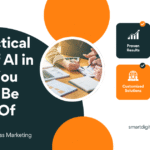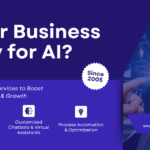In 2025, artificial intelligence (AI) has transitioned from being a concept of the future to an integral part of our daily lives. From morning until night, AI is woven into our routines, augmenting convenience, safety, efficiency, and even enjoyment. The influence of AI on our existence is profound, transformative, and rapidly expanding.
This blog delves into how AI is redefining our everyday interactions across various domains including homes, workplaces, healthcare systems, education sectors, and transportation networks.

1. Intelligent Homes for Enhanced Living
By 2025, home automation has achieved unprecedented levels of sophistication. AI-driven virtual assistants such as Amazon Alexa and Google Assistant have advanced to become effective home managers. They adapt to your everyday patterns — like when you rise in the morning or your ideal room temperature and lighting settings.
Smart thermostats automatically modify heating and cooling based on forecasts and who is at home. Refrigerators equipped with AI monitor food supplies and recommend recipes according to what ingredients are on hand. Furthermore, security systems utilizing AI can identify known individuals while monitoring for unusual activities in real time—significantly improving residential safety.
2. On-Demand Personalized Healthcare
Artificial intelligence is ushering in a transformation towards personalized and proactive healthcare solutions. By 2025, wearable technology will do more than just track steps; these devices will consistently monitor vital parameters, identify irregularities, and notify both the user and their healthcare providers. AI-driven algorithms can foresee potential health problems prior to the onset of symptoms, enabling individuals to steer clear of serious medical conditions.
Telemedicine platforms leverage AI for patient triage, providing diagnostic suggestions and treatment recommendations. In managing chronic ailments such as diabetes and hypertension, AI offers tailored daily guidance based on each person’s specific requirements.
3. AI in Education: Customized Learning Experiences
Thanks to artificial intelligence, education has become increasingly accessible and personalized. Modern learning platforms are capable of adjusting content dynamically to align with individual students’ strengths, weaknesses, and preferred learning modalities. Regardless if you are a student at school or an adult pursuing professional development online, AI guarantees a distinctive and optimized educational journey.
AI-enhanced tutoring systems offer round-the-clock assistance by resolving queries, creating quizzes, and supplying immediate feedback on writing tasks. Within classrooms, AI helps educators quickly spot students who may be struggling earlier on and provides them with targeted support interventions.
4. Transforming the Nature of Work
By 2025, workplaces are more agile, data-focused, and productive thanks to artificial intelligence. Virtual assistants aid in organizing meetings, condensing documents, and even composing emails. In sectors such as marketing, customer service, and software engineering, AI technologies handle repetitive tasks automatically, allowing people to concentrate on strategic planning and innovative thinking.
AI-powered hiring platforms evaluate resumes, determine candidate suitability, and minimize biases in the recruitment process. Within manufacturing and logistics sectors, AI-enhanced robots along with predictive maintenance solutions boost operational efficiency while minimizing downtime.
5. Innovating Transportation
In 2025, self-driving cars are becoming increasingly prevalent. Artificial intelligence allows vehicles to manage traffic conditions efficiently, prevent collisions, and alleviate commuting anxiety. Public transportation systems are also evolving through AI technology that assesses real-time information for optimal route planning and scheduling.
Navigation applications now take into account user habits and preferences alongside current traffic conditions to deliver highly personalized travel recommendations. Moreover, AI is essential in lowering carbon footprints by enhancing fuel efficiency as well as bolstering electric vehicle support infrastructure.
6. A New Era of Shopping and Entertainment
In 2025, the experience of online shopping resembles a customized boutique journey. Artificial intelligence comprehends your preferences, purchasing habits, and even your emotional state, delivering personalized suggestions and deals. The convenience of voice-assisted transactions and virtual fitting rooms has transformed online shopping into an effortless experience.
Meanwhile, in the realm of entertainment, platforms like Netflix and Spotify utilize AI to curate content that feels tailor-made for individual users. Music, art, and narratives generated by AI are expanding creative possibilities and reshaping our media consumption habits.
7. Advancements in Financial Well-Being through AI
AI-driven financial technology applications enable users to control their finances more effectively. By 2025, digital financial advisors assess spending patterns, recommend budgeting plans, and can even autonomously handle savings and investment strategies tailored to overarching financial objectives.
The sophistication of fraud detection has significantly increased; AI systems continuously oversee live transactions to identify anomalies immediately. Additionally, AI enhances credit scoring by incorporating a wider array of diverse data points for greater inclusivity.
8. Social Connections and Interaction
AI chatbots and virtual companions are becoming increasingly prevalent, providing emotional assistance, friendship, and dialogue. AI-driven translation services eliminate language obstacles, facilitating smoother communication worldwide.
Moreover, social media platforms now incorporate AI to improve content distribution, identify harmful materials, and foster safer online environments.
Concluding Thoughts: The Unseen Influence of AI
By 2025, Artificial Intelligence resembles electricity — all around us yet often unnoticed. Its impact reaches every aspect of our lives, enhancing system intelligence, speeding up services, and simplifying daily tasks. Despite ongoing concerns regarding ethics, data privacy issues, and workforce displacement, the advantages of AI are clear.
As we interact with AI regularly — through our homes, mobile devices, vehicles,
and workplaces — it’s crucial to remain knowledgeable and engaged about how this technology is molding our future.
The forthcoming landscape isn’t just automated; it’s intelligent (learning), adaptable (responsive), and fundamentally focused on humanity.









